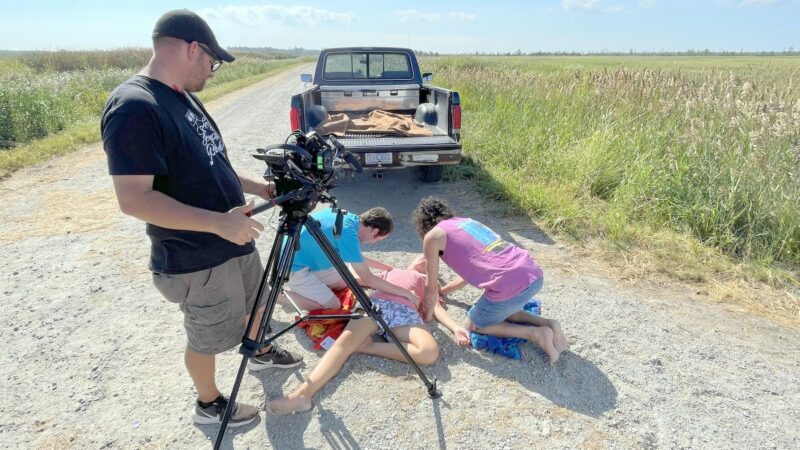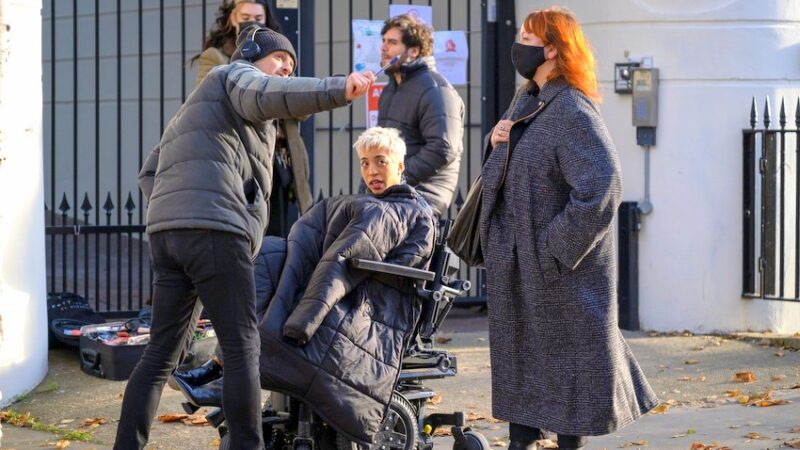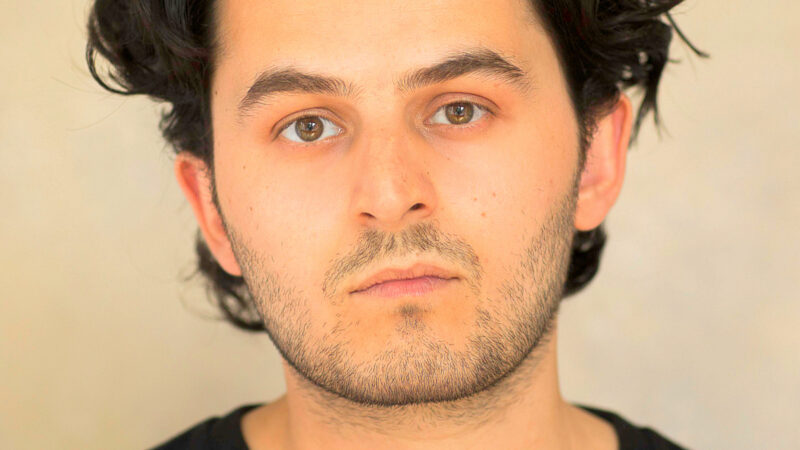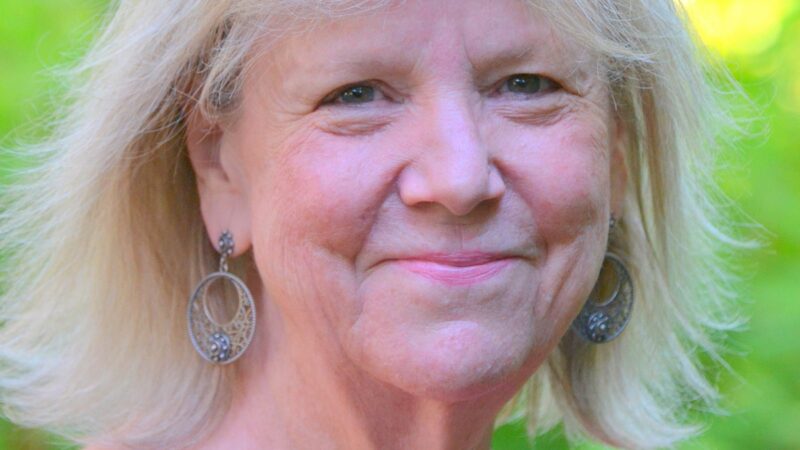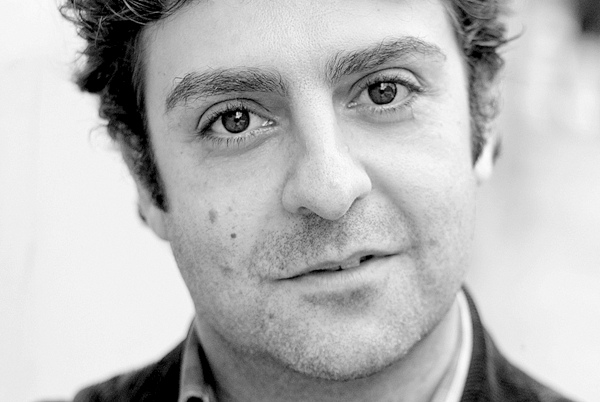
Marcus Markou‘s family were one of the first families in Birmingham, UK to get a video recorder (a big huge Panasonic VHS that weighed as much as a baby elephant). His mother was also a film lover. So at the age of 8 – and years before anyone else was recording movies off the TV – Marcus Markou was watching films that his mother had recorded on a loop – such as “Some Like It Hot” and “The Good, The Bad and the Ugly”. As a kid in the late 70s, there wasn’t much on TV. In fact, TV didn’t start till the afternoon.
So for an 8 year old, this machine that was able to play back movies, was magical. We also had other films we watched (I had younger brothers) so many times that I learned the screenplays. These included Errol Flynn’s “Captain Blood” and the 1962 film “Jack the Giant Killer”. I had no idea at the time films like “Good, Bad and the Ugly” or “Some Like It Hot” were classic movies made by legendary film directors. When you are 8 – these are funny movies or action movies.
Talking “one shots” with @EdStoppard today & how Spielberg hides them in his films. This was mine from 26 seconds in https://t.co/XXBebXpsLe
— Marcus Markou (@PapaSonsFilm) April 2, 2017
I don’t exaggerate when I say that by the time I was 10 or 11 I had seen these films maybe 30 or 40 times. TV on a Saturday, for kids, didn’t start till about 9am. We would be up at 7am and the only thing on TV on a Saturday morning would be Open University lectures on the BBC. So it was natural for us to play one of these magical tapes. We also had the Beatles movie “Yellow Submarine” and “What’s Up Doc”. In fact, “Whats Up Doc” and “Some Like It Hot”, have the ability to reduce me to tears. This is because I didn’t have a happy childhood, in many respects. It was difficult. Family life was very up and down – reflected in the up and down fortunes of the Papadopoulos family – and these films were the most wonderful escape for me. No. Not just escape. They were nurture.
We look for nurture in the strangest places. Recently, I saw “Some Like It Hot” at the BFI – for the first time in 20 years or so. And I did find myself crying a lot after. The film saved me. Grown-ups dressing up as women, being hilarious. This was the world of grown-ups I believed was out there – fun, free spirited, funny, funny, funny! As an eight-year old these characters became my friends. Jack Lemmon holds a special place in my heart. Truly. As a child I also found acting on stage liberating too. I didn’t mind getting up there as child and this continued into my teens.
Strange experience. Reading this, only to find myself in it! #indiefilm #papadopoulosandsons pic.twitter.com/M4tnC3uPtT
— Marcus Markou (@PapaSonsFilm) March 26, 2017
At school I found myself being cast in all the leads and through my teens I was privileged to play the leads in plays such as Arthur Miller’s “A View from the Bridge” and Dario Fo’s “Accidental Death of an Anarchist” and Brecht’s “Resistible Rise of Arturo Ui”. Again, I was exposed as an actor to classics. I was just 14 when I played the maniac in Accidental Death of an Anarchist and it truly changed my life. One night the set fell down at the back but it felt natural to stop the play and ask the stagehands to come on stage and put the set up. I didn’t know you couldn’t just do that. So I just stopped the play and got the stage hands on to put up the set and made jokes at their expense. Everyone thought this was scripted, that it was part of the play.
So I understood very early on the power of improvisation and how the audiences’ desire to accept and believe and go on the journey of the story was very strong. People love to suspend their disbelief. Storytelling is within our psyche. These things continued through University. I took plays to the Edinburgh festival. I wrote plays at University and then in my late 20s I went to London Academy of Music & Dramatic Art (LAMDA) and trained as an actor. Then after LAMDA I joined an improv theatre company, wrote plays for the stage and then in my late 30s decided to take a filmmaking course and found that things just clicked. I understood story and actors and storytelling. I made a short and then I made Papadopoulos & Sons.
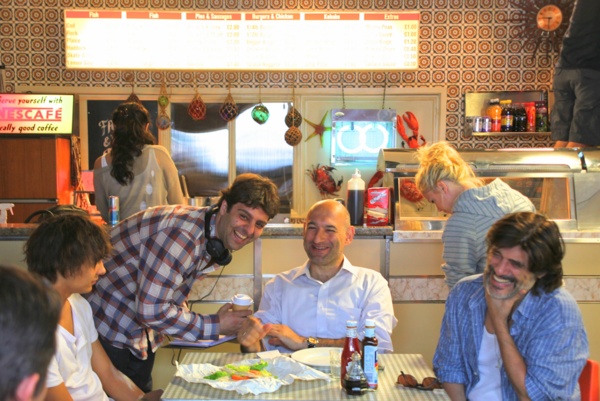
Marcus Markou on Papadopoulos and Sons set
Did you study what you do?
I had a play on at the Trafalgar Studios called “Ordinary Dreams or How to Survive a Meltdown with Flair” in 2009. The critics didn’t like it but audiences loved it. Someone pointed out that the audience was very much a TV and Film literate audience that we had managed to attract. They also pointed out that my play was written more like a film script because I had lots of short scenes and many changes of locations. Then a friend suggested I turn it into a movie. So I spent a couple of months looking for a film director and the same friend suggested that I do it. But I had no intention of doing it because I just wouldn’t know where to start with it. So I looked at film making classes and very quickly found myself at Met Film School in London doing a part-time film making course. I loved it. As I said before, something clicked.
What is your filmmaking process?
I throw away the floorplan! Because I am actor led and because my stories are drama comedies I believe the floorplan can get in the way of a good performances. So in the case of “Papadopoulos & Sons” I worked with a DP (who I also worked with on my short) that allowed me to rehearse the actors on set by allowing the actors to find their own natural blocking. We would clear the set of any crew so the actors could get a feel for the space. Often, the actor is seeing the space for the first time. And they have to believe this is a house they have lived in for years or an office they work in each day. So I let the actors get a feel for the space without any crew. We would then rehearse the scene and I would allow the actors to find their own natural blocking.
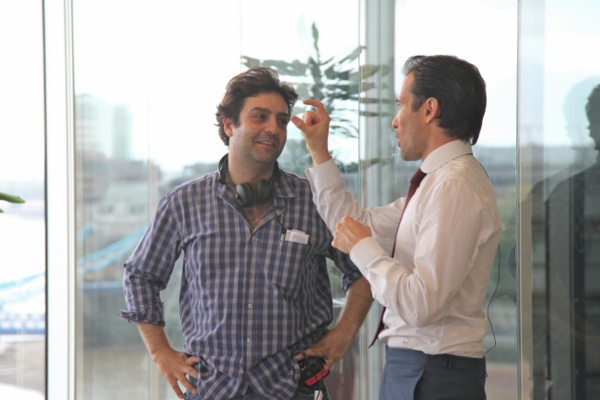
Marcus Markou with Ed Stoppard on the set of Papadopoulos and Sons
With a floor plan you are effectively blocking the actors without them taking ownership of how they walk into a place, where they sit and what line they want to stand on etc. This allows for the actors to find their own natural blocking. The DP would then take an SLR and shoot during this rehearsal to get the set ups. After the rehearsal he would show me the key set ups for the scene and maybe at this stage we would ask an actor to walk around a table another way – in order to save on a set up – or ask an actor to sit in another chair (if possible) for the purpose of getting the right shot. But in principle, this process is actor led and 80% of the blocking would be the actors.
Once we had the set ups, this would be communicated to the First Assistant who would know that the first three or four set ups would be “must haves” within the time allocated. The rest of the set ups would be “nice to haves”. While the actors went for a rest – say 45mins to an hour – the DP would work on lighting the scene based on the setups we had decided on. And the because the actors had rehearsed for an hour beforehand, we would find that we could shoot those four or five pages in just two or three hours. So from start to finish – from rehearsal to final set up – we would be four or five hours for those four or five pages.
This is how we managed to shoot the film in just 24 days. Because this process allowed actors to own the story and if you watch Papadopoulos & Sons it shows in the performances of the actors – great, great actors like Stephen Dillane and Georges Corraface. Hollywood Reporter stated that Stephen Dillane gave one of his best ever showcase performances. I was really proud of this because I believe the quality of these performances reflected how we shot it. Actor led. And we did this without compromising on the cinematic quality of the movie. We framed classically. We lit simply and beautifully.
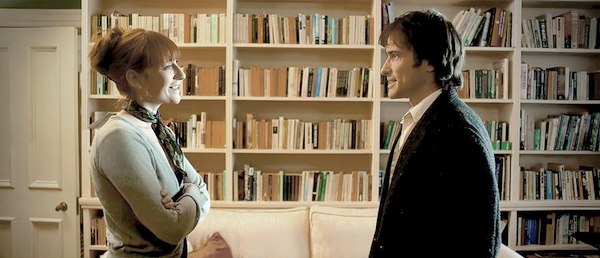
Chris and Nikki meet again in The Last Temptation of Chris
Tell us about the work you have produced?
I produce most of my work. I started out as a writer who became a producer to get my work seen and then realised that I needed to be a director in order to get the work seen in a way that I felt was right. And then I became a distributor because I needed it to be seen!
Do you take courses to improve your craft?
Yes. Always. In fact, a couple of years ago I did an intensive Meisner class. I was the only filmmaker in the room. But I loved it. I learned so much. As a director and as a writer, I believe we should always be acting.
How do you combine acting, producing and writing?
I think that they are all branches of the same storytelling tree. They just are. The part of the brain that is deployed as an actor is the same, I think, as a writer. When you are writing you are improvising as you go along. I am doing it now as I write these answers. I have no idea what I am going to say next! But I know something will follow if I trust and let go. The best actors are always letting go and trusting that something will emerge. Same with writers. How else can we surprise ourselves? And when we do, we know that we will also be surprising audiences.
How did you get into the film business?
Necessity!
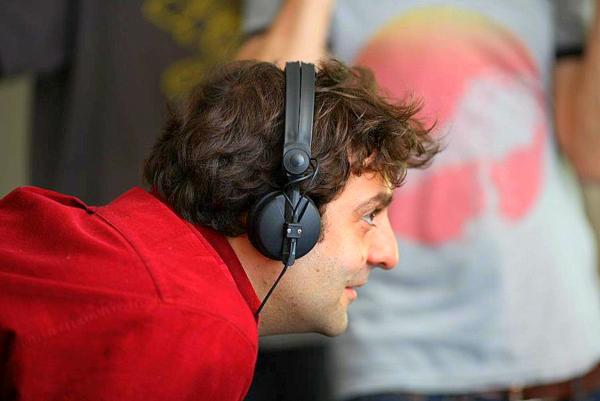
How do you turn an idea into a screenplay?
If you can write out the story as a short story in three or four pages then you have the basis for the screenplay. Often, people come to me and say they have an idea for a story, can I help them? I then ask them to write it out, as if they were telling the story over dinner to friends or in a bar. I ask them to write out the story as if they are telling it. How does it start? Who are the main characters? What happens? If you can do that then you have the basis for a screenplay. Often, people cannot do that. It’s just a sketch of an idea. Tell the story. Write it out as a short story over three or four pages.
Explain your writing process?
You need an impulse or an image or a piece of conversation that is buzzing around your head. This is the germination of the idea. You then need to be able to craft a premise around it. What is the story about? Who does what to how and why and what does this person learn and how does this person change? Once you have the premise… “It’s about a man who loses everything in a financial crisis only to discover the riches of family life” then you can start thinking about scenes. Three or four key scenes will jump into your head. I start writing down these scenes and a rough order. And then the characters come to life from this and from the characters emerge conflicts. Who wants what? And then more scene ideas come to mind.
I try and work out the entire story before I write any dialogue. So by the end of this process I end up with around 40 or 50 scenes in an order. Then I write the first draft. I will always work with a script development professional to keep getting notes and feedback along the way. This is how you can sharpen the screenplay over a number of drafts. My current screenplay is on The Black List – it’s getting good reviews but it’s also throwing up some interesting feedback that I can now incorporate again into the next draft.
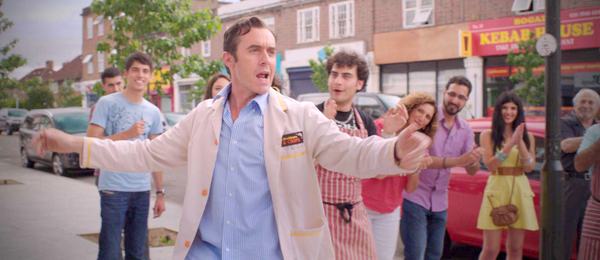
What writing tip or idea can you give young writers?
Read screenplays and watch films. But if you can read a screenplay of the film you are watching this is even better. This is instant education. I don’t do it as often as I should. But, if you wanted to dramatically improve your writing, you would just need to do this once a week. Find a classic movie, get the screenplay and then read the screenplay as you watch the movie. Stop it and go back. Make notes. Do this once a week and within a year you will have learned so much.
We are all too lazy and we want instant fixes. But with writing it really is about watching and reading and then writing. I am currently doing a playwriting course. It’s once a week, every Wednesday night for 40 weeks. Yes, 40 weeks. We have to have watched or read two plays before our Wednesday class. And between classes we have homework – writing scenes set by our teacher. The improvement in my writing has been instant. I am doing this to keep me active. I guess it’s like the courses question above.
Tell us about the directing work you have done?
I directed a short movie called The Last Temptation of Chris and I directed Papadopoulos and Sons. I am directing a short this Summer and hoping to direct a new feature film that I have written (view my current slate)
What do you want to change about the film business?
It is what it is. I am not a complainer. Where doors shut, find another door. If opportunities don’t come your way, see it as an opportunity. I wouldn’t change anything. The business is unpredictable, and ephemeral. At times it’s insane. But it is always very exciting. Should the crazy river raft ride down the rapids be smoother? Ride it!
Papadopoulos & Sons is sandwiched between Robert De Niro and @KermodeMovie on BBC iPlayer. An achievement… sort of pic.twitter.com/63zLE6bh5j
— Marcus Markou (@PapaSonsFilm) March 6, 2017
What do you want to be remembered for?
Being a good father!
What do you want from an actor during production?
To find the truth and have fun.
What do you prefer to work with a producer during production?
To find the truth and have fun (within the budget set!)
What can a director do to get into the film industry?
Find stories that you resonate with. A director is a story teller. Find the other story tellers that share your story or share the stories you want to tell – whether they are writers or actors or producers. Find your story telling tribe.
Who is your favourite director?
Billy Wilder
Why?
From the Apartment to Some Like It Hot – Billy Wilder told human stories that I can relate to. He understood humanity. We all want love, we have to laugh and it’s a little bit crazy – embrace it.
What advice would you give young directors?
It’s the same as the above. Find your story telling tribe. Find the stories that resonate with you emotionally. Don’t try and guess the market or what the market might want. Not even the market knows it’s a market.
INTERVIEWS
In Conversation with Michael Oblowitz Director of Confidential Informant
Confidential Informant stars Mel Gibson, Dominic Purcell, and Kate Bosworth
more interviews




